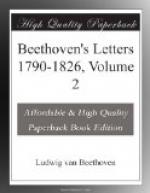I heartily thank you for the trouble you have taken in aiding my charitable work.[1] I rejoice that its success is universally admitted, and hope you will never fail to let me know when it is in my power to serve you by my poor talents. The worthy municipal corporation is, no doubt, thoroughly convinced of my good-will; in order to give fresh proofs of it, we ought to have a friendly interview as to the mode in which I can best serve the corporation. When such a master as yourself takes an interest in us, our pinions ought never to droop.
I am, with the warmest esteem,
Your friend,
BEETHOVEN.
[Footnote 1: Seyfried, at a concert for the benefit of the Burgher Hospital, performed Beethoven’s grand fugue Fest Ouverture (in C major, in Op. 124), 1822, in celebration of the opening of the new Josephstadt Theatre. The written parts were returned to him with the grateful thanks of the committee.]
THIRD PART
LIFE’S TROUBLES AND CLOSE.
1823 TO 1827.
315.
TO ZELTER.[1]
Vienna, Feb. 8, 1823.
MY BRAVE COLLEAGUE IN ART,—
I write, having a favor to ask of you, for we are now so distant from each other that we can no longer converse together, and, indeed, unhappily, we can seldom write either. I have written a grand mass, which might also be given as an oratorio (for the benefit of the poor, a good established custom here). I do not wish to publish it in the usual way, but to dispose of it to some of the leading courts alone. I ask fifty ducats for it. No copies are to be sold except those subscribed for, so that the mass will be, as it were, in manuscript; but there must be a fair number of subscribers, if any profit is to accrue to the author. I have made an application to the Prussian embassy here, to know if the King of Prussia would vouchsafe to take a copy, and I have also written to Prince Radziwill, to ask him to interest himself in the affair. I beg you likewise to do what you can for me. It is a work that might likewise be useful to the Academy of Singing, for there is scarcely any portion of it that could not be almost entirely executed by voices. The more these are increased and multiplied in combination with instruments, the more effective would be the result. It ought to be appropriate also as an oratorio, for such societies as those for the benefit of the poor require marks of this kind. Having been an invalid for some years past, and consequently my position anything but brilliant, I have had recourse to this scheme. I have written much; but as to profits, they are nearly nil! The more do I look upwards; but both for his own sake, and that of others, man is obliged to turn his eyes earthwards; for this, too, is part of the destiny of humanity. I embrace you, my dear fellow-artist, and am, with sincere esteem,
Your friend,




